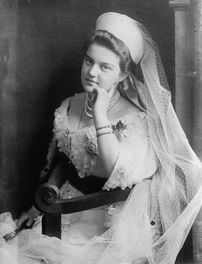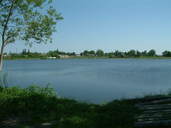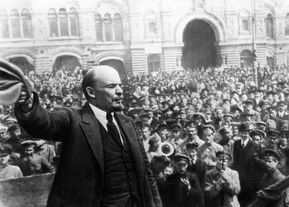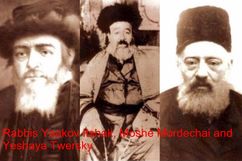 I have been perusing the fascinating work of Project1917, which documents day by day the thoughts and deeds of dozens of individuals who witnessed and participated in the events of the Russian Revolution. Here are some of the views expressed exactly 100 years ago, at the end of November 1917, about events in St Petersburg and Kiev, three weeks after the Bolshevik Revolution. Firstly, the Ukrainian-Russian writer Vladimir Korolenko, a life-long opponent of Tsarism, who initially welcomed the Revolution, but later became a critic of Bolshevik power: “Ukraine has been pronounced a republic. There is no centralised power in Russia. The country is falling apart. Maybe the healing process will begin from the provinces? However, it's not clear if the Rada has any authority.” Ukraine’s Central Rada had declared a Ukrainian People’s Republic opposed to Communist rule, and gained independence from Russia in 1918. But the healing process Korolenko spoke of took many years. Russia’s Civil War tore through Ukraine and the Russian ‘provinces’; peace was not restored until 1921. Korolenko spent the war years in Poltava, Ukraine, protesting against the atrocities committed by all sides in the conflict. The writer and philosopher Vasily Rozanov echoed Korolenko’s view: “Russia has disappeared in two days. In three days at most. Even the paper Novoe Vremya couldn’t be closed faster than Russia was closed. It’s astonishing that it fell to pieces all at once. The world has never experienced anything similar. There was no Tsardom left, no Church, no army, no working class. What is left, then? Almost nothing.” And I love this description of a trip to the theatre by the Grand Duchess Maria Pavlovna, a granddaughter of Tsar Alexander II and cousin of Tsar Nicolas II, which illustrates the immediate changes experienced by Russia’s elite after the Revolution. “One evening at the very beginning of the Bolshevist rule, my husband and I decided to go to the ballet. I had never before been in the Imperial Theatres otherwise than through a private entrance and in the imperial box, and I found it interesting to view the house from orchestra seats, as a private individual. We bought our tickets and went. At that time no one ever thought of dressing for the theatre so we went as we were. “We arrived when the spectacle had already begun. During the first interval we went into the foyer. The theatre was crowded by people from all walks of life. I remember that from the beginning I was shocked by the contrast between the well-known music and performance and the unusual, odd appearance of the house. “On our way back to our seats I looked up—it must have been for the first time—and saw the box on the right side of the stage which from time immemorial had been occupied by the imperial family. Framed by the heavy silk draperies, in the arm-chairs with the gilded backs, there now sat several sailors, their caps on their dishevelled heads and with them their ladies in woollen, coloured kerchiefs. “All things considered, there was nothing unusual in this sight, but nevertheless it affected me powerfully. My sight grew dim; I felt myself about to fall, and groped for the hand of my husband, who was walking beside me. Beyond that, I remember nothing. I came to myself after a thirty-minute fainting spell, the first and the last in my life, lying upon the hard oilcloth couch of the theatre's infirmary. The strange face of a doctor was bending over me and the room was filled with people who must have come to stare.” The Grand Duchess escaped from Russia, via Ukraine, in July 1918 and led a peripatetic life, settling in Paris, New York, Argentina and finally Germany. Many close members of her family who remained in Russia were murdered by the Bolsheviks. www.project1917.com
0 Comments
 Two stories have been in the news this month about famous people whose history lies in Ukraine’s Jewish community either going back to their roots, or their roots coming back to them. Odessa played host last month to a conference organised by Limmud, the international organisation dedicated to Jewish learning. Ahead of the conference, huge billboards appeared around the city featuring images of Bob Dylan surrounded by slogans proclaiming the American folk hero’s Odessan heritage. Dylan’s grandparents left Odessa for the US in 1907, their departure prompted by one of the Russian Empire’s worst waves of pogroms, which began in 1905. In that year, more than 300 Jews were killed in anti-Semitic attacks in Odessa alone. The city’s Jewish community at that time was the second largest in Russia at around 140,000, with Jews making up around 40% of the population. The family settled in Minnesota, where Robert Zimmerman, later to become Bob Dylan, was born in 1941. “We will celebrate the wonderful gift that Odessa gave the world,” proclaimed the founder of Limmud’s branch in the former Soviet Union, Chaim Chesler. “This shows that the Jewish roots that come from Odessa last forever.” Surprisingly, local reaction to the imported Dylan-mania was underwhelming , his music apparently being not widely recognised in Ukraine. But there was no outright hostility, unlike that met by the actress Mila Kunis, who recently visited her childhood home in Ukraine. The Hollywood star told the media this month that she had travelled to her native town of Chernivtsi in August in the hope of visiting the house that she had left back in 1991, when her family had emigrated to the US. “We went to our house and I knocked on the door because we really wanted to look inside. And [the owner] was like, ‘No!’ She did not care. I said, ‘I used to live here when I was little, my parents are here.’ …She wouldn’t even open the door. The whole experience was very humbling,” Kunis said in an interview. These experiences differ hugely from my own encounters when visiting my ancestral home in Ukraine back in 2005. My father and I, along with our cousin Irina who had emigrated from Kiev to Germany ten years earlier, spent several days driving around some of the country’s largely forgotten backwaters southwest of Kiev in search of the villages where our family had lived and worked. Like Kunis, I found the experience humbling, but for very different reasons. People were overwhelmingly friendly, welcoming, interested and eager to help. We turned up in villages without prior warning and asked the locals whether there were any old people in the vicinity who might have lived there around the time of the Russian Revolution and Civil War. In one village, Khodarkov, an elderly lady invited us in to meet her 95-year old mother. The daughter shooed out the chickens from the front porch and ushered us into the living room, where the stooped old babushka recounted stories of the pogroms in 1919, during which the Jews were drowned in the lake (see photo). My grandmother’s great-aunt had survived this pogrom by hiding in the cellar of her husband’s shop, stuffing her children’s mouths with rags to stop them from crying. She and her family had fled to Kiev immediately afterwards, taking with them only the clothes on their backs. They emigrated to Canada in 1929. When we left the house, the daughter tried to give us a precious family photo as a gift and it was all that we could do to press her to keep it and cherish it for her own family. In the town of Andrushky, we tracked down a sugar factory, still functioning, that had belonged to an influential landowner that my great-great grandfather had worked with. Here we were initially interrogated at length by the factory director before he would respond to any of our questions, fearful perhaps that we were sugar barons ourselves, travelling to Ukraine with the aim of snapping up cheap commercial assets. Once he was satisfied with our story, he offered us vodka, which we declined. We drank tea instead and he provided us with a written account of the factory’s history, which verified that it was, indeed, the one connected to our family. Then he proceeded for the next three hours to show us around the warren of new administrative buildings that were being constructed. In all the other towns and villages linked to our family history that we visited – Pavoloch, Makarov, Talne, Berdichev – we were warmly greeted and local people spent many hours with us showing us sites and recounting the area’s history. Like so many Ukrainian Jews, most of our ancestors moved away, unable to endure any more of the suffering they had been forced to tolerate for so long. The ancestors of those we met there had stayed behind in the ‘old country’, and suffered so much more. It was humbling indeed.  Today marks the centenary of Russia’s Bolshevik Revolution. As recent media broadcasts have repeatedly told us, Lenin’s men seized power in the autumn of 1917 and the world’s first communist state was born. But the reality was not so simple. Across parts of the Russian Empire the revolution unleashed a brutal civil war and it was several years before the Bolsheviks consolidated power. One such area was the territory of present-day Ukraine, my ancestral home. The fall of the Russian Provincial Government in Petrograd on 7 November 1917 (25 October according to the Russian calendar of the time) prompted a power struggle in Kiev that was to last for four years. The abdication of Tsar Nicholas II in March 1917 had led to the formation of Ukraine’s Central Rada, or parliament. In November, following the Bolshevik Revolution, it declared a Ukrainian People’s Republic opposed to Communist rule, and gained independence from Russia in 1918. In the years that followed, the government in Kiev changed hands so many times that it became difficult to keep track of who was supposed to be in charge. My family came from the village of Pavoloch, about 60 miles from Kiev. Here the October Revolution gave way to anarchy, as newly formed ‘banda’ – or armed factions – roamed the land. Some fought for Communism, others for Nationalism, Anarchism, Freedom or Holy Russia. The names of their leaders instilled fear: Petlyura, Makhno, Zeleny, Denikin. Later, in 1919 Pavoloch repeatedly became a sea of carnage as one banda after another passed through, stealing, raping, pillaging and killing. The White Army, under General Denikin, was the most ruthless of all. His professional soldiers were armed by western powers, including Britain, which wanted to see the Communists defeated. The Whites hated the Communists, but more than anything else they hated the Jews. They barged into Jewish homes, drew their swords and cut inhabitants down regardless of age or sex. Anyone who tried to escape was shot in the back as they fled. They threw grenades into cellars, blowing up entire families; poured petrol over synagogues and set them alight; raped thousands of women. One day five White Army soldiers burst into my family’s home. They searched the house for money, kicking down the door of the warehouse and smashing floorboards. One of the soldiers dealt my great-great grandfather a blow with his rifle butt and watched him crumple to the floor, then kicked him repeatedly in the stomach. They hustled the old man onto the table, pull his scuffed leather belt from around his waist and force his head into the noose they made with it. Then they hanged him from the meat hook on the kitchen ceiling. After the soldiers left, the frayed old belt snapped in two and my great-great grandfather landed with an almighty thump on the hard stone floor. He had survived! This is only one of around a dozen terrible incidents that affected my family during the Civil War. Here is Canadian scholar Orest Subtelny’s assessment of the time: “In 1919 total chaos engulfed Ukraine. Indeed, in the modern history of Europe no country experienced such complete anarchy, bitter civil strife, and total collapse of authority as did Ukraine at this time. Six different armies-– those of the Ukrainians, the Bolsheviks, the Whites, the Entente [French], the Poles and the anarchists – operated on its territory. Kiev changed hands five times in less than a year. Cities and regions were cut off from each other by the numerous fronts. Communications with the outside world broke down almost completely. The starving cities emptied as people moved into the countryside in their search for food.” The Bolsheviks finally secured power in the region in 1921 and the following year it became part of Soviet Ukraine.  I, and many others with a similar background, owe a great debt to a young Ukrainian called Vitaliy Buryak, who is single-handedly documenting the shtetls of Ukraine on his website (link below). He has recently put together a page on Makarov, the home of my great-grandfather Meyer Unikow. This week I have been providing him with some information for the site, some of which he will pass on to the museum in Makarov, where the new curator is putting together an exhibition on the town’s Jewish community. The town is about 40 miles west of Kiev, with a population of around 12,000. In 1897, when my great-grandfather was 25 years old, almost 4,000 Jews lived in Makarov, about three-quarters of the town’s population. Today there are 10, all of them incomers after World War II. My great-grandfather (on my grandmother’s paternal side) grew up at the court of the Twersky Rabbis of Makarov, a famous Hassidic dynasty that originated in Chernobyl, a town now notorious for an entirely different reason. Rebbe Menachem Nachum Twersky (b.1805, Chernobyl – d. 1852, Makarov), the first son of the second Chernobyl rebbe, founded the Makarov branch of the dynasty. The rabbis that my family would have lived, studied, prayed and eaten with are Rebbe Yaakov Itshak Twersky (1828-1892, Makarov), Rebbe Moshe Mordechai Twersky (b. 1843, Makarov – d.1920 Berdichev) and Rebbe Yeshaya Twersky (b. 1861, Makarov – d.1919, Kiev). Rebbe Yaakov Itshak was a very influential rabbi, respected by the community. My great-great grandfather (on my grandmother’s maternal side) Berl Shnier was a devoted follower of his, despite living a day’s journey away in the town of Pavoloch. He would consult the Makarover rabbi on all important family matters, and usually spent Shabbat at the Twersky court. This is how he came to arrange the marriage of his daughter to the son of one of the Rabbi’s right-hand men and tutor to his sons – my great-great grandfather Velvl Unikow. Rebbe Moshe Mordechai Twersky was apparently famous for the power of his prayers, making them unforgettable for those who heard them. His son, Rebbe Tsvi Arye, who was known as a healer and miracle-worker, moved the court to the larger town of Berdichev – considered the capital of the Jewish Pale – after his father’s death. Makarov’s Jewish population was decimated during the Civil War of 1917-21, in particular in the summer of 1919 when pogroms by a faction led by the Cossack leader Sokolovsky and another led by Matviyenko slaughtered 20 Jews and prompted the majority of the Jewish population to flee. Of those who remained, around half were killed by a further pogrom carried out by the White Army under General Denikin. Most of those who fled never returned to Makarov and by 1926 the town’s Jewish population had been slashed to under 600. Vitaliy’s website recounts events described in some of the memoirs written about the pogroms by those who witnessed them. The details are truly horrific. During World War II, Makarov was occupied by the Nazis from July 1941-November 1943. In the autumn of 1941, up to 100 Jews were shot, amid several other mass shootings of between 7 and 30 members of the Jewish community at a time. Their belongings were sold to the local population. I visited Makarov with my father in 2005. The Twersky court was destroyed by the Nazis and nobody in the town knows exactly where it stood. The place where the main synagogue was located is now a rubble-strewn patch of wasteland close to the large, Soviet-style town square. The old Jewish cemetery has been destroyed. The graves of the Twersky rabbis Moshe Mordechai and Tsvi Arye were safeguarded and their remains reside in the vast Jewish cemetery in Berdichev. Thanks to money sent from abroad, their graves are topped with newly hewn gravestones of slate and marble and housed in a small, painted mausoleum. More information is available at http://jewua.org/makarov/ |
Keeping stories aliveThis blog aims to discuss historical events relating to the Jewish communities of Ukraine, and of Eastern Europe more widely. As a storyteller, I hope to keep alive stories of the past and remember those who told or experienced them. Like so many others, I am deeply troubled by the war in Ukraine and for the foreseeable future, most articles published here will focus on the war, with an emphasis on parallels with other tumultuous periods in Ukraine's tragic history. Archives
March 2024
Categories
All
|
 RSS Feed
RSS Feed
